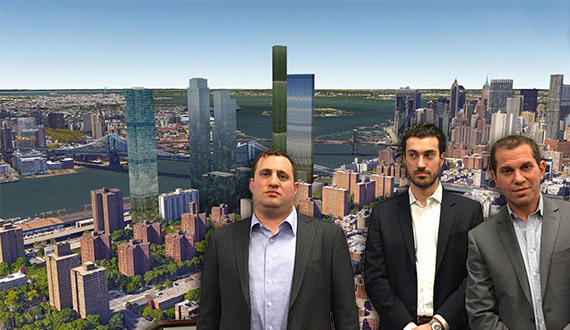After a bitter and drawn-out review process, the city approved a trio of large-scale residential towers on the Lower East Side waterfront on Wednesday.
In a 10-to-3 vote, the City Planning Commission voted in favor of a controversial application, filed jointly by four developers, to build three residential towers in Two Bridges that together will add 3,000 housing units to the neighborhood. They include JDS Development’s 1,000-unit rental tower at 247 Cherry Street; L+M Development and CIM Group’s 798-foot tower at 260 South Street; and Starrett Corporation’s 730-foot building at 259 Clinton Street.
Combined, the projects represent $4.5 billion worth of investment in the neighborhood, and would add nearly 700 affordable units.
“The three proposed projects will deliver lasting and meaningful benefits for the Two Bridges community,” the developers said in a statement, pointing to required repairs to a local NYCHA complex, the East Broadway subway station, and the construction of affordable housing units.
In casting her “yes” vote, CPC Chair Marisa Lago said that from a legal standpoint, the buildings comply with underlying zoning rules in the district. “This is nonetheless a challenging situation because the proposed buildings aren’t minor in scale and will affect the surrounding neighborhood.”

From left: Renderings of the Two Bridges Towers (credit: CityRealty) with JDS’ Michael Stern, CIM’s Alex Kafenbaum and Starrett’s Josh Siegel
But she cited several benefits to the neighborhood, including wheelchair access to the East Broadway subway station, new public space and the addition of nearly 700 affordable units — “a truly rare opportunity” to add affordable housing in Lower Manhattan. “This represents the largest privately-financed affordable housing development in the city’s history,” she said.
She said the developers have also committed $12.5 million to the New York City Housing Authority’s Two Bridges development. And the developers will form a community construction task force to act as a forum where locals can express their concerns.
Allen Cappelli, a member of the planning commission, also voted yes but said he felt somewhat “ambivalent” about doing so. “Part of my reluctance on this issue has been, perhaps, my frustration with the limitation of what our actual authority is from time to time,” he said. “In analyzing this particular situation, I agree with the legal [determination] that essentially our hands are tied.”
Over the past three years, community groups and housing advocates have railed against the proposals, expressing concern for how they will impact traffic congestion and school enrollment. The projects are being developed as-of-right, meaning they didn’t require special approvals to go forward. But after a failed attempt to force them through the city’s labyrinthine land-use review process, the trio went through an environmental study to determine what could be done to mitigate negative effects on the community.
That yielded some concessions from developers: In late 2017, JDS said it would help pay for a flood barrier at two neighboring buildings.
In January, Manhattan borough president Gale Brewer and local council member Margaret Chin proposed a zoning text amendment that would require projects in Two Bridges to receive a special permit forcing them to go through the Uniform Land Use Review Process (ULURP).
